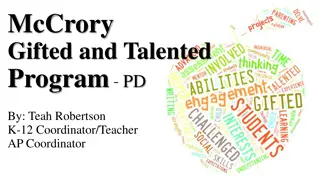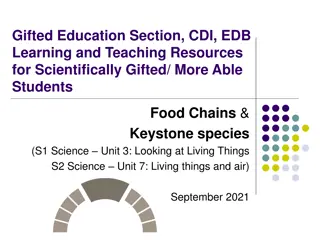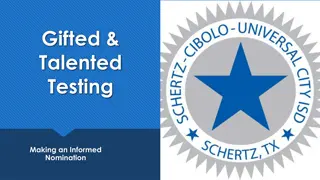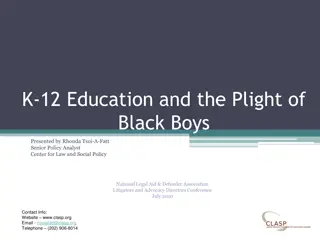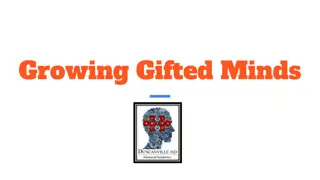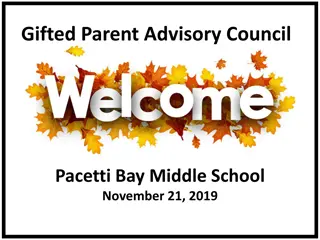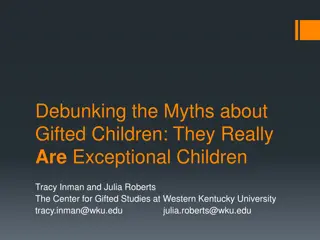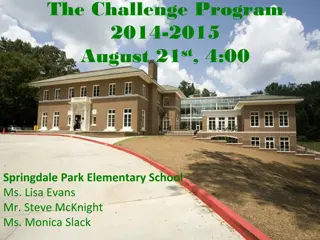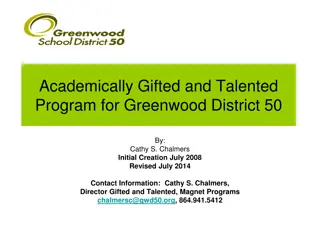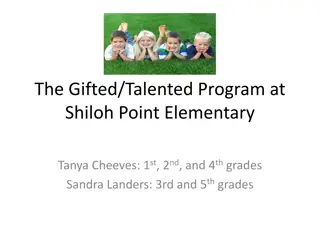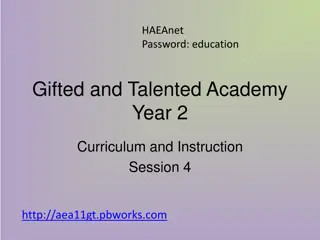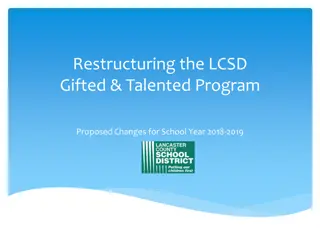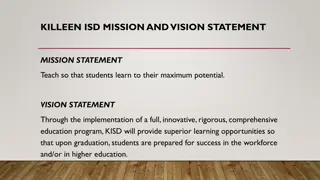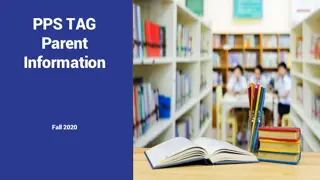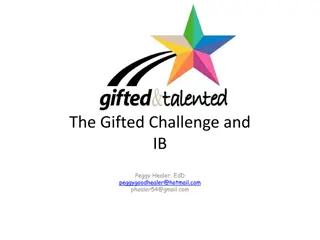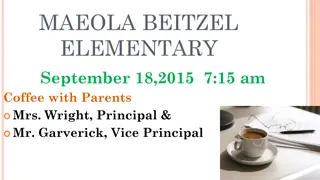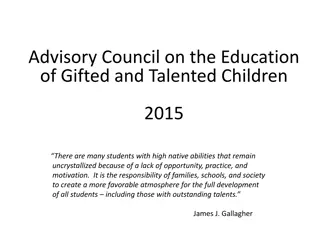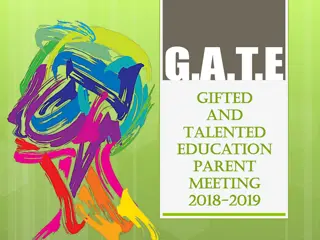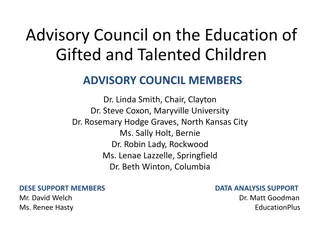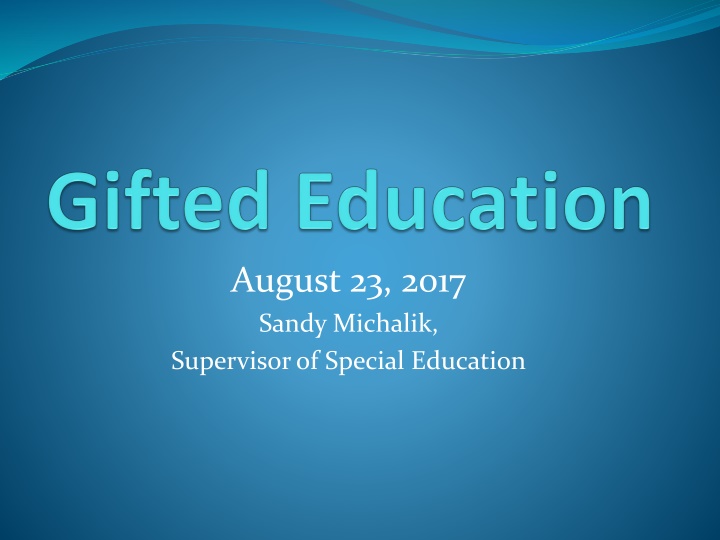
Giftedness in Education
Explore the concept of giftedness in education, as defined by PA Chapter 16, and learn how specially designed instruction caters to students with outstanding intellectual and creative abilities through specialized service delivery options. Discover the criteria for identifying gifted students, including factors like high IQ levels, academic performance, and early skill development, as well as characteristics such as higher-level thinking skills and leadership abilities.
Download Presentation

Please find below an Image/Link to download the presentation.
The content on the website is provided AS IS for your information and personal use only. It may not be sold, licensed, or shared on other websites without obtaining consent from the author. If you encounter any issues during the download, it is possible that the publisher has removed the file from their server.
You are allowed to download the files provided on this website for personal or commercial use, subject to the condition that they are used lawfully. All files are the property of their respective owners.
The content on the website is provided AS IS for your information and personal use only. It may not be sold, licensed, or shared on other websites without obtaining consent from the author.
E N D
Presentation Transcript
August 23, 2017 Sandy Michalik, Supervisor of Special Education
What is Giftedness? PA Chapter 16 determines that specially designed instruction is provided for a population identified as meeting criteria that verifies that these students require specialized service delivery options.
What is Giftedness? Gifted is defined as outstanding intellectual and creative ability, the development of which requires specially designed programs or support services, or both, not ordinarily provided in the regular education program.
What is Giftedness? Through an evaluation conducted by the school psychologist, the student is identified as gifted. Several factors contribute, including: IQ of 130 or higher Multiple criteria - academic performance, demonstrated achievement and other observed skills that strongly indicate gifted ability
What is Giftedness? Multiple criteria also refers to achievement, rate of acquisition/retention, demonstrated achievement, early skill development Achievement= A year or more above grade achievement level for the normal age group in one or more subjects as measured by nationally normed and validated achievement tests able to accurately reflect gifted performance.
What is Giftedness? Rate of acquisition = the speed at which the student is able to acquire, understand, and demonstrate competency or mastery of new learning. An example of acquisition/retention: the gifted student, after approximately one to three repetitions of new knowledge/skills, is able to achieve mastery; other students may require four to eight repetitions. Rate of acquisition/retention is used to adjust the pace of learning for the gifted student.
What is Giftedness? Higher level thinking skills, academic creativity, leadership skills, academic interest areas, communication skills, foreign language aptitude or technology expertise
What is Giftedness? Children have three ages: Chronological based on birth Emotional based on maturity Intellectual based on the ability to apply knowledge and skills
What is Giftedness? What is the difference between a high achiever and a gifted learner?
A High Achiever Knows the answers Has good ideas Works hard Commits time and effort to learning Answers questions Is a top student
A High Achiever Understands ideas Grasps meaning Is a good memorizer Is receptive Absorbs information Listens with interest Is pleased with own learning
A Gifted Learner Asks the questions Has original ideas Performs with ease May need less time to excel Offers detailed and unique responses Is beyond his or her age peers
A Gifted Learner Constructs abstractions Draws inferences Is insightful; makes connections Is intense Manipulates information Shows strong feelings and opinions Is highly critical
Intervening Factors that Mask Gifted Abilities Disabilities English as a Second Language Gender/Race Bias Socio-Cultural Deprivation
Did you know On the average, 1.0% of a school district s poulation is gifted.
It May Not Be Easy Being Gifted! Truly gifted learners may have a difficult time fitting in socially with their peer group. They may feel different or weird. Gifted students may have a difficult time making social connections or maintain meaningful friendships. It can be challenging for parents, as well, especially when siblings are involved.
It May Not Be Easy Being Gifted! Become frustrated with the pace of the class or lack of academic challenge Rebel against routine and predictability Become bossy with teachers and peers Become intolerant of imperfection in himself or others Monopolize class discussions Become impatient when not called on; may blurt out answers Resist cooperative learning Become overly sensitive to perceived criticism and cry easily Stubborn in own beliefs Challenges authority Strong willed asserts self and ideas
How do we find children who may be in need?
Gifted Delivery Models Enrichment versus Acceleration or a combination of both
Gifted Delivery Models Small group pull-out versus Enrichment in the general education class
By any other name. Real World/ Authentic 21st Century Skills
Acceleration Grade skipping Early entrance to school Subject acceleration Grade telescoping Concurrent enrollment Advanced Placement courses Early admission to college Credit by examination Compacting the Curriculum
Gifted Delivery Models The input of the general education teacher is critical. This teacher knows the content better than a gifted teacher.
An effective system finds the child has an assessment plan that is prescriptive has defined targets has a clear link to curriculum and instruction (Standards)
What Content/Core Teachers Should Do Be sure to review and refer to the GIEP Keep in contact with the gifted teacher Provide requested information to the school psychologist or gifted teacher in a timely manner As an expert in your field, seek enrichment activities, lessons, projects Provide data/progress monitoring information when requested Attend GIEP meetings when invited
Ideas How have you differentiated already? Enrichment Acceleration Strategies that support enrichment and acceleration Cluster Grouping Flexible Grouping Access to Technology Use of Alternate Resources Use of Alternate Assessment Techniques
What Content/Core Teachers Should Do In developing specially designed instruction, there are four aspects that should be considered as the framework: Curriculum Instruction Process Product
What Content/Core Teachers Should Do Focus on and be organized to include more elaborate, complex, and in-depth study of major ideas, key concepts, and themes that integrate knowledge within and across disciplines. Be an extension of core learning, using both acceleration and enrichment strategies. Streamline curriculum that the student is able to master quickly. Encourage exposure to, selection of and use of varied, challenging and specialized resources.
What Content/Core Teachers Should Do Provide opportunities for students to recognize complex relationships and arrive at sound generalizations. Stress higher-level thinking, creativity, and problem solving skills. Set high standards that demand rigorous expectations for student work and performance demonstration. Promote in-depth learning and investigation that deals with real life problems and issues. Select concepts and content that promote students involvement as practitioners of the discipline.
What Content/Core Teachers Should Do Allow for the development and application of productive thinking skills to enable students to re-conceptualize existing knowledge and/or generate new understanding. Be flexibly paced and matched to the student s ability, pre- assessment data, learning style, interest, and motivation. Provide students with the freedom to choose topics to study and the methods to use in manipulating and transforming information. Promote independent, self-directed and in-depth study. Encourage the application of advanced research and methodological skills.
What Content/Core Teachers Should Do Focus on open-ended tasks. Provide opportunities for students to develop leadership and group interaction skills. Allow student-centered discussion, Socratic questioning and seminar-type learning. Encourage the development of products that challenge existing ideas and produce new ones. Incorporate the application of discipline methodologies in product development.
What Content/Core Teachers Should Do Promote products that are comparable to those made by professionals in the designated field. Require that products of gifted students represent application, analysis, and synthesis of knowledge. Provide the opportunity to create products/solutions that focus on real-world issues. Establish high-level and exemplary criteria to assess student performance and products.
What Content/Core Teachers Should Do Delivery Models: Curriculum Compacting Cluster Grouping Independent Study Grade and/or Subject Acceleration Field Experiences Out-of-school educational experiences Tiered Assignments Honors Classes Advanced Placement Post-secondary Enrollment Pull-Out Program Enrichment Resource Room/Area Self-contained classroom
When planning for challenge and differentiation for your gifted learners, keep the following in mind: Gifted students benefit from being grouped with intellectual peers for a significant part of the instructional day. This will stimulate them to achieve more than they would if they work alone or in mixed ability groups. Provide multiple opportunities for creative outlets through open-ended projects and products. Provide depth in content areas and subjects of interest to gifted students, moving beyond the curriculum. Allow time for gifted students to explore their passion areas and express them in varied disciplines and mediums.
When planning for challenge and differentiation for your gifted learners, keep the following in mind: Make sure gifted students are not punished with MORE work or a lesser grade because they take a risk. Replace the standard curriculum with more challenging opportunities. Provide higher level activities and lesson options on a regular basis, including divergent and evaluative thinking. Provide opportunities for gifted learners to be challenged and encourage perseverance in the face of obstacles. Encourage independent study and research skills, including the use of multiple resources and the reading of original documents. Reduce the amount of lecture, worksheets, drill, and practice.
Gifted Education It is not something we leave up to just one person, it requires a coordinated effort, it requires systematic data collection and analysis with an emphasis on how that data inform the way teachers instruct our students
Website Resources Pennsylvania Association for Gifted Education (PAGE), www.penngifted.org Pennsylvania Department of Education www.pde.state.pa.us Pennsylvania State Education Association (PSEA), www.psea.org National Association for Gifted Children www.nagc.org National Research Center for Gifted and Talented, www.gifted.uconn.edu Critical Thinking Press, www.criticalthinking.com Davidson Institute for Talent Development, www.ditd.org
Website Resources Engine-Unity, Ltd., www.engine-uity.com/ Free Spirit Publishing, www.freespirit.com Gifted Education Press, www.giftedpress.com Gifted Psychology Press, Great Potential Press www.giftedbooks.com Connie Belin & Jacqueline N. Blank Center for Gifted Education, www.education.uiowa.edu/belinblank/ Mindware, www.mindwareonline.com Pieces of Learning, www.piecesoflearning.com Prufrock Press, www.prufrock.com

